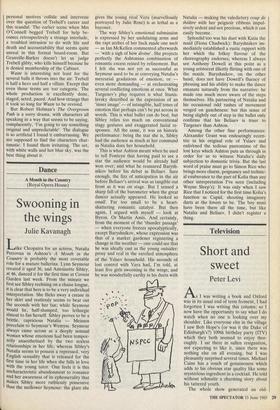Dance
Swooning in the wings
Julie Kavanagh
Like Cleopatra for an actress, Natalia Petrovna in Ashton's A Month in the Country is probably the most covetable role for a mature ballerina. Lynn Seymour created it aged 36, and Antoinette Sibley, at 46, danced it for the first time at Covent Garden last week. From the minute we first see Sibley reclining on a chaise longue, Lt is clear that hers is to be a very individual interpretation. She flicks away a crease in her skirt and restlessly seems to beat out the seconds with her fan; while Seymour would lie, half-slumped, too lethargic almost to fan herself. Sibley proves to be a brittle, capricious Natalia — Meissen Porcelain to Seymour's Wemyss. Seymour always came across as a deeply sensual Woman whose emotions had been tempor- arily anaesthetised by the two sexless relationships in her life; whereas Sibley's Natalia seems to possess a repressed, very English sexuality that is released for the first time in her life when she falls in love With the young tutor. One feels it is this uncharacteristic abandonment to romance and her awareness of its ephemerality that makes Sibley more ruthlessly possessive than the mellower Seymour: the glare she
gives the young rival Vera (marvellously portrayed by Julie Rose) is as lethal as a bayonet.
The way Sibley's emotional submission is expressed by her undulating arms and the rapt arches of her back made one melt — as Ian McKellen commented afterwards — 'with a sigh of how divine'. She projects perfectly the Ashtonian combination of romantic excess reined by refinement. But I felt she was not yet as successful as Seymour used to be at conveying Natalia's mercurial gradations of emotion, or — even more demanding — at orchestrating several conflicting emotions at once. What Turgenev's play requires is what Stanis- lavsky described as the expression of an 'inner image' — of intangible, half tones of emotion that perhaps can't be put across in words. This is what ballet can do best, but Sibley relies too much on conventional stagy gestures and exaggerated facial re- sponses. All the same, it was an historic performance: being the star she is, Sibley had the audience as much at her command as Natalia does her household.
This is what Ashton meant when he used to tell Fonteyn that having paid to see a star the audience would be already half won over; and what he reassured Barysh- nikov before his debut as Beliaev. Sure enough, the fizz of anticipation in the air before Beliaev's arrival was as tangible out front as it was on stage. But I sensed a sharp fall of the barometer when the great dancer actually appeared. He looked so small. Far too small to be a heart- shattering romantic catalyst. But then again, I argued with myself — look at Byron. Or Martin Amis. And certainly, from the moment of the 'thunder passage' — when everyone freezes apocalyptically, except Baryshnikov, whose expression was that of a market gardener registering a change in the weather — one could see that he was ideally cast as the young outsider: prosy and real in the rarefied atmosphere of the Yslaev household. His seconds of lost control with Vera had, I'm told, at least five girls swooning in the wings; and he was wonderfully earthy in his duets with Natalia — making the valedictory coup de theatre with her peignoir ribbons impul- sively ardent and not precious, which it can easily become.
Splendid too was his duet with Katia the maid (Fiona Chadwick): Baryshnikov im- mediately established a rustic rapport with her which the folksy flavour of the choreography endorses; whereas I always see Anthony Dowell at this point as a young aristocrat illicitly flirting with one of the maids. Baryshnikov, on the other hand, does not have Dowell's fluency of phrasing and his ability to make the dance emanate naturally from the narrative: he made one much more aware of the steps themselves. His partnering of Natalia and his occasional odd rushes of movement verged on gaucheness: but this sense of being slightly out of step in the ballet only confirms that his Beliaev is truer to Turgenev than Ashton.
Among the other fine performances: Alexander Grant was endearingly eccen- tric in his original role of Yslaev and enliVened the tedious pantomime of the lost keys which Ashton puts us through in order for us to witness Natalia's daily subjection to domestic trivia. But the last word of praise must go to Simon Rice who brings more charm, poignancy and technic- al exuberance to the part of Kolia than any other interpretation I've seen (including Wayne Sleep's). It was only when I saw Rice that I noticed for the first time Kolia's function as Cupid, shooting imaginary darts at the lovers to be. The boy must have been there all the time, but like Natalia and Beliaev, I didn't register a thing.


















































 Previous page
Previous page